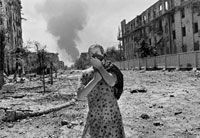 War is about destruction. The rhetoric that justifies war is usually about value systems, preserving them, defending them, often imposing them. But the real reason that nations, or groups of people go to war, is to destroy the other side. There are no "limited wars". Even if destruction is confined to military targets, there has been total destruction somewhere in the arena of battle. An innocent life is taken, a piece of property or a way of life belonging to a non-combatant destroyed utterly. This is the main reason that the world's committed pacifists, those with the bravery to stand up for their beliefs, whatever the cost, deplore war. It is uncontrollable, once it starts, no matter what the "Defence Correspondents" tell you on television, or the generals affirm with their laser pointers in slick media briefings.
War is about destruction. The rhetoric that justifies war is usually about value systems, preserving them, defending them, often imposing them. But the real reason that nations, or groups of people go to war, is to destroy the other side. There are no "limited wars". Even if destruction is confined to military targets, there has been total destruction somewhere in the arena of battle. An innocent life is taken, a piece of property or a way of life belonging to a non-combatant destroyed utterly. This is the main reason that the world's committed pacifists, those with the bravery to stand up for their beliefs, whatever the cost, deplore war. It is uncontrollable, once it starts, no matter what the "Defence Correspondents" tell you on television, or the generals affirm with their laser pointers in slick media briefings. War is the abject failure of peaceful diplomacy, intelligence gathering, negotiation and compromise. It is often the last resort of the bungling politician, or the first choice of those who perceive themselves as too weak to meet an enemy halfway. Battles, even when backed by a righteous majority, destroy more than they achieve. War alone will never solve a problem. Often it will exacerbate it in the long term. Anyone who thinks the coming blitzkrieg on terror will put a stop to the vile tactics of killing and maiming the innocent had better think again.
What is about to happen is-I fear-likely to throw up an army of new recruits for the battalions of terror. There are vast feelings of alienation out there, in every society on earth, that go to heinous extremes under untold pressures. And it's not hard to fall outside the mainstream, not at all. The men whose caused a United Nations of innocent bloodshed on 11 September were, we're told, middle class, fathers, husbands, people "like us". How could they do it?
If there's be a lesson, a result, a development that encourages and gives hope to our children, perhaps it should a real commitment to find the answer to that question. Is it too much to hope that the inevitable war will have another side to it? That war on the battlefield, in the skies or at sea, can be matched by soul searching among the citizens of the Fortunate World.
We-and I am, of course, one of them-need to spend the next year or so agonising over everything we have, and whether by having it we deny others. We must accept that a wronged people-Americans and the rest of us from countries that support the coming war-need more than violence to purge the world of terror. We need to address its causes, not as an empty, political debate about whose side we're on, but as an admission that the real enemy is exclusion, not evil existing in a vacuum. We need to marshal battalions of sociologists, psychiatrists, anthropologists, even journalists. This needs to be part of a huge process of reaching out to the dispossessed at home and abroad, The extremism bred by exclusion is a festering symptom of trouble to come, not an evil to be deplored in rhetoric, ignored in practise.
I still support the United States and all the others. While recognising that there are reasons for the evil acts in New York City, Washington and over Pennsylvania, I deplore to the depths of my soul what has happened. But as a card-carrying member of the only species of animal that seems to believe in hope, I insist that we learn from all the mistakes we can. If some potential terrorist somewhere is deterred by high, efficient security, if good law enforcement prevents a hijack or a bombing before innocent blood is shed, if the anti-terror warriors manage to arrest and apply justice and due process to those behind the attack on America, then right has triumphed over wrong, good over evil.
But more importantly, there will only be real victory, genuine takbeer if no baby is ever again born surrounded by institutionalised violence and fanaticism, in the Middle East, Kashmir, Afghanistan, Rwanda, Chechnya or even the Bronx. Or whatever local version of them you would care to name.



